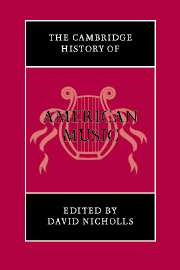Book contents
- Frontmatter
- PART ONE
- 1 American Indian musics, past and present
- 2 Music in America: an overview (part 1)
- 3 Secular music to 1800
- 4 Sacred music to 1800
- 5 African American music to 1900
- 6 Immigrant, folk, and regional musics in the nineteenth century
- 7 Nineteenth-century popular music
- 8 Art music from 1800 to 1860
- 9 Art music from 1860 to 1920
- PART TWO
- Bibliography and references
- Index
- References
5 - African American music to 1900
from PART ONE
Published online by Cambridge University Press: 28 March 2008
- Frontmatter
- PART ONE
- 1 American Indian musics, past and present
- 2 Music in America: an overview (part 1)
- 3 Secular music to 1800
- 4 Sacred music to 1800
- 5 African American music to 1900
- 6 Immigrant, folk, and regional musics in the nineteenth century
- 7 Nineteenth-century popular music
- 8 Art music from 1800 to 1860
- 9 Art music from 1860 to 1920
- PART TWO
- Bibliography and references
- Index
- References
Summary
The history of African American music is fascinating because on the one hand very little disappears, but also nothing remains the same. The features that give African American music its unique character can be found in many of its genres and time periods. Differences only occur in the degree to which elements are emphasized. Although several of the features associated with black expressive forms can be found in the music of other cultures, the manner in which these elements are externalized and blended suggests that African American performance practices are derived from Africa (Wilson 1974). However, the type of music blacks created in the Americas, particularly before 1900, depended upon the extent of interaction and ethnic distribution among Africans, the demography and geographical location of black and white populations, the demands of the white masters, and the characteristics of the economy.
To appreciate fully the essence of the black music experience in the United States, a thorough understanding of its African roots is critical. While there have been several excellent studies that have examined what African Americans have created (see works by Southern and Epstein), few scholars have looked extensively at the roots, contextual factors, and demands which caused blacks to create their music. In addition, most overviews have not been successful in providing a clear and complete picture of the continent of Africa during the period when Africans were transported to the Americas. Not only have peoples on the African continent been presented as a homogeneous group, but the central focus has been on societies in West Africa. Africans were drawn from numerous ethnic and linguistic groups and different societies.
- Type
- Chapter
- Information
- The Cambridge History of American Music , pp. 103 - 134Publisher: Cambridge University PressPrint publication year: 1998
References
- 1
- Cited by



